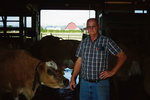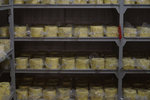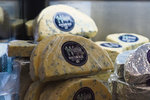


[slideshow_deploy id='10518']
Story and photos by Sarah Sharp
Whatcom County is home to an abundance of locally sourced cheese. The Northern Light visited a selection of Ferndale farms and creameries just 20 minutes from Blaine to glean knowledge from their artisan cheese makers.
Appel Farms
Now one of the largest cheesemakers in Washington state, Appel Farms started “backwards” from most.
Founder Jack Appel immigrated from Holland to Ferndale in 1950, where he bought a dairy farm and tinkered with cheese making in his spare time. But it wasn’t until friends and neighbors tasted the fruits of his artisan craft that he decided to add cheese to Appel Farm’s repertoire of dairy products.
Now, his sons and their families fill Jack’s shoes – metaphorically that is – although his Dutch wooden clogs hang on their store wall as a proud reminder of the past. Rich and Ann Appel tend to their herd of 500 Jersey and Holstein milking cows, while John and Ruth Appel continue the tradition of cheese making and run Appel Farm’s picturesque cheese shop.
While artisan cheesemakers typically gain traction in the creamy world of cheese through local fans, Appel Farms started selling wholesale directly to cheese lovers in California and on the East Coast. Occasionally, people will venture from as far as Europe to end up in the farming community of Ferndale (pop: 12,343), craving a taste of Appel Farm’s signature quark – a soft white German cheese that’s often compared to cream cheese and sour cream.
“Again, that’s backwards,” Ruth Appel said, laughing.
But that’s not to say locals haven’t since come around.
Appel Farm’s nine cheeses (cheddar, feta, gouda, maasdammer, paneer, parmesan, quark, havardi and nokkelost) warrant no introduction in many Whatcom County shops and farmers markets.
The award-winning farm also acts as a leader among cheesemakers in Whatcom County. Back in 2005, when Appel Farms’ cheeses began establishing a household name, there were just six cheesemakers in all of Washington state. Now, there are 71 and counting. That’s better for everyone: cheesemakers and consumers alike, Appel said.
“[Seeing new cheese shops pop up] the last few years has been wonderful,” she said. “They round out the market.”
Appel Farms is located at 6605 Northwest Drive, Ferndale, WA. For more information, visit appel-farms.com or talk to one of their cheese professionals at 360/ 312-1431.
Ferndale Farmstead
A little taste of Naples, Italy can be found alongside a gravel road within the farmlands of Whatcom County. A rare but delightful oddity in the Pacific Northwest, the Ferndale Farmstead crafts authentic old-world Italian cheeses.
Their mantra, “Seed to Cheese,” speaks to their closed loop system of creating artisan cheese. About 95 percent of the crops grown on the farm are fed to their mixed herd of Jersey, Holstein and Scandinavian red cross-breeds, said Dan Wavrin, the farmstead’s expert cheesemaker.
Wavrin’s father and uncle share 25 years of dairy farming experience, so the creamery’s milk source was already in place for Wavrin to begin experimenting with cheeses in 2011; it was just a matter of mastering the art of old world cheese.
Wavrin partnered with Raphael Mascolo, a Naples native and veteran artisan cheesemaker, who spent a week in Ferndale showing Wavrin the ropes. Wavrin still works closely with Mascolo, consulting his expert advice on the phone at least once a week. Wavrin imports all of his rennets and cultures from Naples to craft the farmstead’s nine cheeses: asiago, fontina, romano, caciotta, scamorza and fior di latte, a mozzarella that’s affectionately known as the “flower of the milk.”
Despite its youth, the Ferndale Farmstead produces about 3,500 pounds of cheese every week. But their mass production doesn’t weaken their cheese’s taste – or reputation. Ferndale Farmstead is the only creamery in Washington to produce authentic Italian cheeses.
And it all starts with the cow. “We believe cows are sacred around here,” Wavrin said.
The Ferndale Farmstead is located on 2780 Aldergrove Road, Ferndale, WA. Visit their Facebook page while their website is under construction or call 360/255-7062.
Twin Sisters Creamery
If you’re not a blue cheese person, it’s Lindsay Slevin’s goal to convert you. Slevin of Twin Sisters Creamery in Ferndale is the mastermind behind Whatcom Blue, the dense, creamy blue cheese that the year-old creamery is already known for.
“It’s just so creamy and approachable,” she said. “We know there’s a love-hate relationship with blue cheese, so for people who are on the edge, we love for them to give ours a shot.”
Between her passion for cheese and her husband Jeff’s background in IT and manufacturing, the couple’s interests seemed like the perfect combination for starting a family business, Slevin said.
While they considered making other cheeses at the start, Slevin said she couldn’t imagine Twin Sisters Creamery without Whatcom Blue.
“We just wanted to do our own thing,” she said. “We didn’t want to make another cheddar or another gouda.”
In addition to Whatcom Blue, Twin Sisters Creamery sells Whatcom White, a raw milk cheese that’s aged for at least 60 days, and gorgonzola dolce. They’re also aging “some fun ones” right now, including white cheese with peppercorn, jalapenos and other flavor profiles, Slevin said.
As a raw milk cheese producer, Twin Sisters Creamery uses about 325 gallons of Jersey milk from Twin Brook Creamery to produce their cheese’s signature creamy taste. Slevin knew she wanted to use milk from a registered Jersey herd, and Twin Brook was the perfect fit, she said.
The Slevins named the creamery after their 7-year-old twin daughters, Maddy and Lexi, who enjoy pitching in around the store by tagging items, helping mom pack cheese and occasionally fighting over the push broom. “They just love being here,” she said. “It’s hysterical.”
Twin Sisters Creamery is located at 6202 Portal Way, Ferndale, WA. For a schedule of upcoming classes, visit their website at twinsisterscreamery.com or call the cheese shop at 360/656-5240.
Twin Brook Creamery: The milk behind the cheese
While Twin Brook Creamery doesn’t produce cheese, cheesemakers around Washington swear by the quality of their 100-percent Jersey milk for cheese making. Twin Sisters Creamery in Ferndale, River Valley Cheese in Issaquah and Neighbor Lady Farm in Renton all use Twin Brook milk in their batches.
The creamery is a fifth-generation farm, employing every generation of the Stap family since 1910. Larry Stap and his wife, Debbie Stap, along with daughter Michelle Tolsma and her husband, Mark Tolsma, now own and operate the farm.
One of the great pleasures of Larry Stap’s job has always been caring for his herd of 225 Jersey cows, or “the girls,” as he calls them.
“My wife says when you look into their eyes, there’s something there,” Stap said. “They’re such a pleasant breed. They’re gentle, and they produce a high quality of milk. We just thoroughly love the Jersey cows.”
Because Jersey cow milk contains a higher protein and butter fat content, it makes the most economic sense to use it for cheeses, Stap said. While 10 pounds of Holstein milk generally yields one pound of cheese, Jersey milk produces an additional 1.5 pounds, he said.
Stap’s new robotic milking machines further compound those numbers. His recent $400,000 investment into two machines has increased milk production by 20 percent – an almost unheard of improvement in dairy farming. The technology allows the cows to choose when they want to be milked, and regulates how many times they can be milked. It’s not uncommon for a cow to circle through the shoot 30 times a day, hoping for an udder massage, but to be pushed right back out 27 of those times, Stap said.
“The cows have responded so well,” he said. “They’re calm; they’re relaxed. I always thought we had relaxed cows before but they’re even calmer now.”
Stap’s approach to farming can best be described by the term, “environmental stewardship,” a principle that aligns with his Christian faith, he said.
That means proper soil care, monitoring water quality and ensuring preventive veterinary medicine. Although he believes in almost all of the aspects of being certified organic, Stap will never become certified himself because he would not be allowed to administer antibiotics to a sick calf in any event. That does not promote good animal husbandry, he said. Otherwise, Twin Brook Creamery does not use synthetic hormones to artificially stimulate milk production or commercial fertilizer or pesticides on their grass fields and pastures.
Then again, the milk speaks for itself.
Kristi Slotemaker, the self-proclaimed “Big Cheese” at River Valley Cheese in Issaquah, teaches classes on cheese making using Twin Brook’s milk.
“She doesn’t have to publicly proclaim the benefits of our milk because it’s displayed in the yield and how it makes cheese, as she’s doing it right there in her class,” Stap said.
Slotemaker offered this recipe for savory ricotta, courtesy of River Valley Cheese:
Ingredients:
1 gallon whole cow’s milk (Not ultra-pasteurized)
1 teaspoon salt
3/4 cup vinegar (I prefer apple cider vinegar)
Procedure:
Using a double boiler, heat milk to 180 degrees F. Stir in one teaspoon of salt while raising heat of milk to 190 degrees F. Remove from heat. Immediately stir in 3/4 cup vinegar. Milk will start to thicken immediately and turn to a light chartreuse color. Ricotta curds will start to appear within a minute or so. Ladle them out as soon as you see them. Keeping them in the whey too long will produce a tough ricotta. Continue to ladle out ricotta curds until they’re all out of the whey. Enjoy!
Comments
No comments on this item Please log in to comment by clicking here